nga ha – my
nüpengyou – girlfriend
nga ha nüpengyou kung kou zih la – My girlfriend is very beautiful
me nüê – wife
be tò, be toa – husband
sih, seah – son
rsong – daughter
ea ku – uncle
a nei – aunt
a bâ – grandfather
a ya – father
an na gou – I love you!
Kam Tibetan of Yüshu/ Northern Kham - ཡུལ་ཤུལ་སྐད
达末——Hello!
尼尕撒 ——Good morning!
秋角炉休——I wish you good luck with your exam!
zhu de mo – Hello
xiu xai xi de hi we a – Like what are you doing?
xiu hi xi de hi– What are you doing?
zhu sa ma se eö nä – Have you already eaten?
Jenpa lekso – Welcome!
Kuzu zangpo – Hello!
Kuzu – Hello (short form)
Kuzu la – Hi!
Ga de bay mo – How are you ?
Ga dey bay yoe – How are you?
Ga dey bai yeg? – How are you?
Lashom, Leyshum – fine, good
Ley shum bay ra – I am fine
Lashom bay rang yoe la – I am fine
Nga lekshom ba ra yeg – I am doing fine
Nga lashom bay rang yoe – I am fine
Choe ga dey bai yeg la? – (And) How are you doing?
nga – I
che, choe – you
ong – yes
ong si – yes, right
Ena la. – Really!
Ena oie – Yep!
Che? – You?, What about you?
Kadrin che – Thank you!
Kadrin che la – Thanks!
Laso la – You are welcome!
Nga ya? – Are you asking me?
Ga chi bay dho – What are you doing?
ga – what
chi – are
bay – you
dho – doing
Movie chi ta bay day yoe – I am watching a movie.
Choe gachi bay mo tey? – And what are you doing?
Nga dzongkha lhap dho – I am learning Dzongkha
lhap – learn
lhap dho – learning, do learn
Churu gi tho za dho – I am eating dinner
churu gi tho – dinner
za dho – eating
Che chey di nga sem gayi – Nice to meet you! (lit.: You meet me makes me happy)
che – you
chey di – meet
sem gayi – happy
Nga ya na da chekha che ba sem gayi la – Nice to meet you too!
Che dzongkha lhabni lu na mey sa mey towra du sa? – You seem very interested in learning Dzongkha
lhabni lu – learning
na mey sa mey – very much
towra – interested
Nga dzongkha lhabni lu na mey sa mey towra yeh – Yes, I am interested in learning Dzongkha
Choe ga tay lay mo? – Where are you from?
Nga Germany lay enn – I am from Germany
Ga yet lay chat bawo mo?- From where are you chatting?
Bhutan na la baw ya- Do you work in Bhutan?
Choe low ga dam che mo – How old are you?
Nga low 19 enn na – I am 19 years old
Nga lai bay dho – I am working
lai – work
Zim cha delay – Good night
Ga ty moe – Where are you?
joo – go
na Lay – from here
napa lay – tomorrow onward
Nima dele – Good afternoon
Tsip maza – Sorry
Gom mathrae – Sorry
Atsi zur nang – Excuse me!
Tashi Delek! – Good luck!
Naba che gae – See you tomorrow!
Tama che gae – See you later!
Log jay gay – Good bye!, We'll meet again
Na me sa me shim be – very delicious
Ani ga chi mo? – What is this?
chu – water
chu tshe – hot water
sha – meat
rochi – dog
gha – smile
nge ama – my mother
lama – God
gangri – mountain
meto – flower
shing – tree
shakam – beef
na – fish
sekam – pork
How hajur – Hello
Tapai kasto hunu huncha? – How are you?
Mo thikai chu – I’m fine
Chö lo ka dzü sombo? – How old are you?
Audi gong ka dzu mo ? – How much does this cost?
Ka dzü mo? – how much?
Kam pya te? – Wherefore?
Chö ka kha mo ? – Where are you?
Kay garnu hundaicha tapai? – What are you doing?
Maile sikkimese vasha sikhay – I learn sikkimese language
maile – I
vasha – language
sikhay – learn
Tapai sikkim ma kun jugha ma basnu huncha – Where do you live in Sikkim?
tapai – you
kun jugha ma - where do?
basnu huncha – live in
dhanyabad – thank you
thuchila – thank you
w de mo – Hello! (cp. Colloquial Standard Tibetan: demu)
yak hua – good
w de mo yen – fine
yen – to be (cp. Kham: xê)
de – where?
a pha – father, dad (cp. Central Tibetan: a ba)
a ma – mother, mom (cp. Central Tibetan: a ma)
a ka – elder brother
a qe – elder sister
nga – I (cp. Kham Tibetan and Central Tibetan: nga)
ko – he (cp. Ladakhi:: ko)
nga co – we (cp. Ladakhi: nga-zha)
ko co – they
lo pan – boss (cp. Chinese: laoban)
qen li – manager (cp. Chinese: jingli)
yen – yes, right
ao le – yes
gang nga – where (cp. Kham: gan na)
nqok – one
gngi – two
hshum – three
wxe /wʑǝ/ – four
wqu /wʨu/– ten
Cqo neng nga qe ser? – What’s your name?
nang – name
Cqo gang nga njo je? – Where do you go?
qe ce – car (cp. Chinese: qiche)
Cqi qe zek no rje? – What do you buy?
ten hwa – telephone (cp. Chinese: dianhua)
fan ndan – restaurant, food shop (cp. Chinese: fandian)
Spoken in: Yunnan Province (China), Kachin & Shan States (Myanmar)
Official language in: Ximeng Va Autonomous County and Menglian Dai, Lahu and Va Autonomous County in Puer City and Cangyuan Va Autonomous County, Shuangjiang Lahu, Va, Blang and Dai Autonomous County and Gengma Dai and Va Autonomous County in Lincang City (Yunnan, China); de jure Wa Self-Administered Division in Shan State (Myanmar), de facto Wa State in Myanmar (declared 1989; until 2011 called Wa Special Region 2 in Shan State by Myanmar)
Speakers: more than 900,000
Scripts: Latin
Greetings and basic phrases
Bawg yam pa mhawm – Hello
Maix hmom! – Hello! (formal, Chinese Wa)
Hmom maix liex – Hello! (informal, Chinese Wa) – Burmese Wa write ‘mhawm’ instead of ‘hmom’
Nyawm ot maix? – How are you?
Nyawm ot aux – I’m fine!
Nyawm ot ex – We are fine!
Hmom ot aux – I’m fine. (Chinese Wa)
aux – I am
nyawm – good
mhawm – good, beautiful
hmom hmiem – very good (Chinese Wa)
mhawm mhawm/ hmom hmom – very good (Reduplication of adjectives causes an emphasis whih can be translated by using English ‘very’)
Laoh lie! – Thanks!
ting bawn son /ting bŏn son/ – Thank you!
ting baun son – Thank you!
pon tix /bun di/ – you are welcome
To kaux maix tix? /do gau mai di:/ – What’s your name?
to kaux – name
ang ching – safe
ang qing – safe (Chinese Wa)
ang caox – no problem!
ang jaox – no problem! (Chinese Wa)
ang hmom – not good (Chinese Wa)
Pui dee mawx? – Where do you come from?
Ot pex dee mawh lie? – Where are you from?
Ot yix Cing Tong – I’m from Kengtung
Mawh maix pui dee mawx? – Where are you from?
Ot aux hauk tiex Germany – I am from Germany
Pake yuh tix lie? – Brother, what are you doing?
pex dee – where
Yuh tix yam in lie? – What are you doing now?
yuh – to do
tix – oneself
yam – time
yam in – now
Mawh maix vax lie – Are you Va?
mawh – to be
mo – to be (Chinese Wa)
vax – Va
lie – question particle (like Chinese ‘ma’)
Читать дальше












